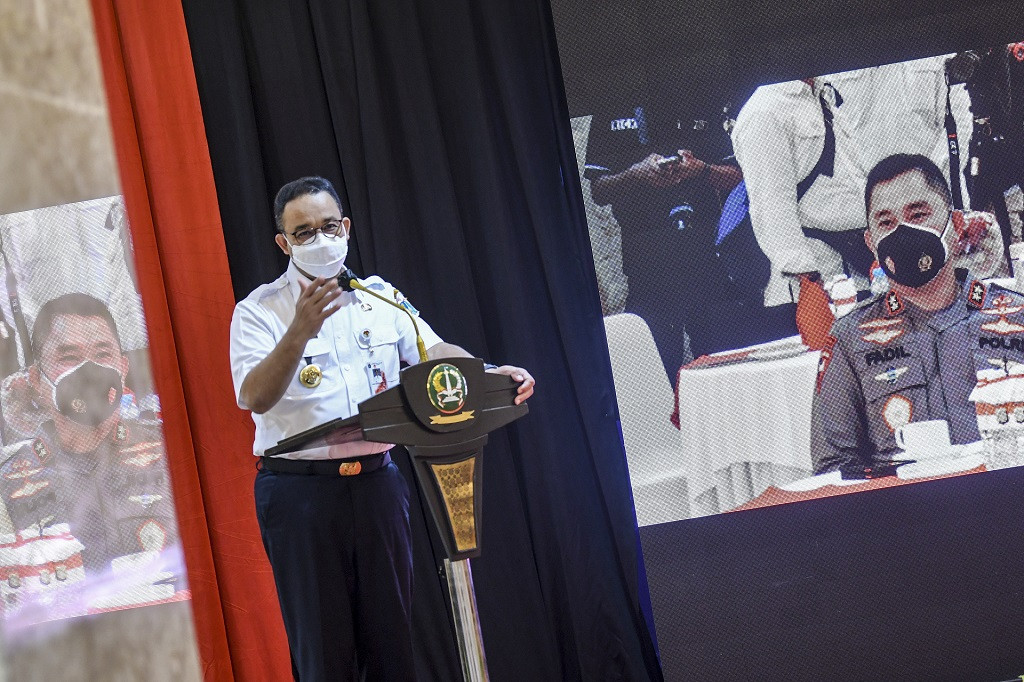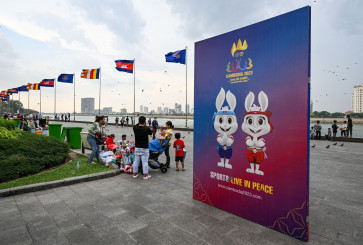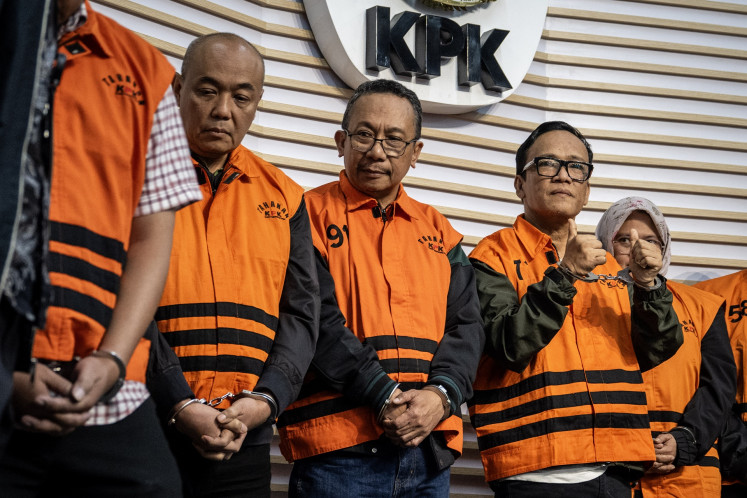Popular Reads
Top Results
Can't find what you're looking for?
View all search resultsPopular Reads
Top Results
Can't find what you're looking for?
View all search resultsAnies checks off campaign promises, but with lackluster delivery
Jakarta Governor Anies Baswedan has managed to deliver some notable achievements this year despite the overbearing sense of crisis, but many of the capital city’s fundamental problems still persist.
Change text size
Gift Premium Articles
to Anyone
I
n 2021, the COVID-19 pandemic was both a curse and a blessing in disguise for Jakarta Governor Anies Baswedan, as he approached his final year in office.
While the global health crisis has stifled his efforts to follow through on a number of unfulfilled campaign promises, analysts suggest that his general success in leading Jakarta through a devastating Delta variant-fueled second wave of infections earlier this year has spared him from tough scrutiny over his lackluster delivery of programs.
Anies managed to make some notable achievements this year despite the overbearing sense of crisis, but a lot of his programs have also fallen short of expectations, with many of the capital city’s fundamental problems persisting under his watch.
COVID-19 capital
One of the former education minister’s most notable achievements this year has been the success in mitigating Jakarta’s COVID-19 outbreak, including during the devastating second infection wave midyear that pushed the city’s healthcare system to the brink of collapse.
Although Jakarta was among the hardest-hit regions during the Delta wave, the capital managed to bring down its daily caseload from around 14,600 to 2,600 and reduce its hospital bed occupancy ratio from 90 to 73 percent, all in just two weeks.
This swift turnaround could be partly attributed to Jakarta’s excellent COVID-19 response, buoyed by ample resources that saw the province constantly recording the most contact tracing and testing among regions nationally, even surpassing by 20 times the minimum testing benchmark recommended by the World Health Organization, which amounted to one test per 1,000 people per week.
Unsurprisingly, for the same reasons, Jakarta still leads in the national COVID-19 vaccination drive. As of Dec. 24, the province had fully vaccinated more than 90 percent of its targeted population of 10 million, far above the national average vaccine coverage of 51 percent.
In September, Jakarta made the list of the top-50 cities in the world with the best pandemic response, according to London-based agency Deep Knowledge Analytics.
The following month, Jakarta received several awards from the Health Ministry for its excellent contact tracing and enforcement of COVID-19 restrictions, among other achievements.
Jakarta’s success in mitigating the outbreak can largely be attributed to policy alignment between its officials and the central government, said political researcher Noory Okthariza of the Centre for Strategic and International Studies (CSIS).
"Unlike last year, when the central government and the city administration had different approaches to dealing with the health crisis, now both President Joko ‘Jokowi’ Widodo and Anies have put their political differences aside to work together in controlling the pandemic," he told The Jakarta Post on Tuesday.
In the early days of the pandemic, both Anies and Jokowi shunned the idea of any “hard” lockdown for fear of economic collapse. But they also had a public duel over the same policy after COVID-19 swept through the capital.
High notes
Outside the sphere of COVID-19, Anies has garnered a lot of buzz lately due to the construction of the highly anticipated Jakarta International Stadium (JIS) in North Jakarta, which is entering its final stage of completion.
The idea for the construction of an international-standard stadium for the capital was tabled in 2009 during the term of then governor Fauzi Bowo. The project gained traction in 2013 following the demolition of the Lebak Bulus Stadium, home of local football club Persija, to make way for the construction of a mass rapid transit (MRT) station.
Several governors after Fauzi had tried and failed to kick-start the megaproject, until Anies finally oversaw the beginning of construction last year.
The JIS – which is costing around Rp 4.08 trillion (US$285.6 million) to build and will be able to accommodate up to 82,000 visitors – is expected to be one of the biggest stadiums in Asia, and the first in Indonesia with a retractable roof, “sky viewing” decks and a hybrid-grass sports field.
Anies also received a lot of recognition this year for his efforts to deliver on an integrated and sustainable urban transportation system in the capital, in spite of the pandemic.
Over the past year, he has overseen the development of 11 kilometers of protected bicycle lanes on two major thoroughfares and revamped several train and MRT stations to allow for a smoother transition between different modes of transportation.
He also continued to expand the city’s bus rapid transit (BRT) system and successfully reached his own target of providing more than 80 percent of Jakarta’s denizens with access to bus stops within 500 meters’ walking distance of residential areas.
These efforts landed the governor a spot on the list of 2021 Transportation Heroes by the Transformative Urban Mobility Initiative (TUMI), a German-backed initiative focused on the promotion of sustainable urban transportation. TUMI complimented Anies for “creating fair, affordable and inclusive transportation for all” and providing “steady transit improvements” amid scarce resources due to the COVID-19 pandemic.
Jakarta also came out as the winner of the global 2021 Sustainable Transport Award (STA) for its ambitious integrated public transportation programs, with Indonesia becoming the first-ever Southeast Asian country to have received the prestigious award.
Despite all of these achievements, however, Anies has not been able to tackle one of Jakarta’s biggest transportation problems: traffic congestion. Traffic has all but returned to pre-pandemic levels, even after a stint of tough mobility curbs managed to temporarily cure another persistent problem: air pollution.
Frequent and fatal city bus accidents have also marred Anies’ achievements. According to city-owned BRT operator Transjakarta’s president director, Mochammad Yana Aditya, there were at least 502 accidents involving the company’s buses from January to October this year.
Flagships fall short
Despite having managed to check off almost all of his campaign promises in the past year, Anies also delivered many lackluster programs and failed to revive a number of stalled projects.
One notable example was his zero-down payment housing policy. According to Jakarta councilor Gembong Warsono of the Indonesian Democratic Party of Struggle (PDI-P), Anies only managed to build 187 apartment units under the subsidy policy this year, bringing the total to 967 units, far below Anies’ initial target. On the campaign trail, Anies promised to solve the city’s affordable housing crisis by building 232,241 subsidized apartment units for low-income families.
But the governor slashed his ambitious target to a mere 10,000 units earlier this year, after the president director of city-owned developer PD Sarana Jaya, Yoory Pinontoang, was named a suspect in a graft investigation linked to land procurement for the program.
Anies also changed the program’s eligibility criteria, making the units available to potential buyers earning up to Rp 14.8 million instead of up to Rp 7 million, casting doubt over his intent to keep a promise to the city’s low earners.
Sluggish progress also haunts the construction of Jakarta’s first waste-to-energy (WTE) incinerator in Sunter, North Jakarta, which Anies claimed would be the technological answer to the city’s piling waste problems.
Construction of the facility has not even started, reportedly because of various paperwork and budgeting issues, three years after the governor kicked off the project in 2018.
His river “naturalization” project, in which authorities would transform Jakarta’s riverbanks into green spaces to mitigate floods, has virtually stalled for the past few years, due to difficulties in procuring land around rivers.
Anies, who pledged not to carry out any forced evictions during his election campaign, has shifted his flood-mitigation priorities to constructing thousands of vertical drainage holes to prevent inundation in the capital.
He aims to construct 1.8 million drainage holes before his term ends next October, but has only managed to drill fewer than 4,000 boreholes so far.
Potential contender
But despite the governor’s shortcomings, political researcher Firman Noor of the Indonesian Institute of Sciences (LIPI) said he believed Anies had sufficiently carried out his duties to be considered a strong potential contender in the 2024 presidential election.
“Anies has proven to the public that a civilian without any military background or massive political connections can successfully lead Jakarta," he told the Post.
Since President Jokowi’s rise to power, the governorship of the nation’s political and commercial capital has been increasingly seen as a stepping stone for politicians to vie for the presidency. Anies seems poised to continue this tradition, but the CSIS’ Noory insists that voters are likely to focus more on his public persona anyway, rather than the sum of his work.
“He will be a strong contender for the election in any case, as our voters tend to choose their candidates based on personal and emotional appeal, not on policy and performance,” he said.










